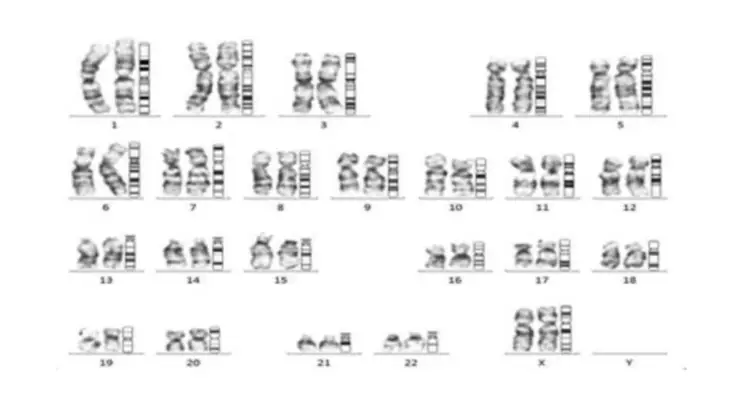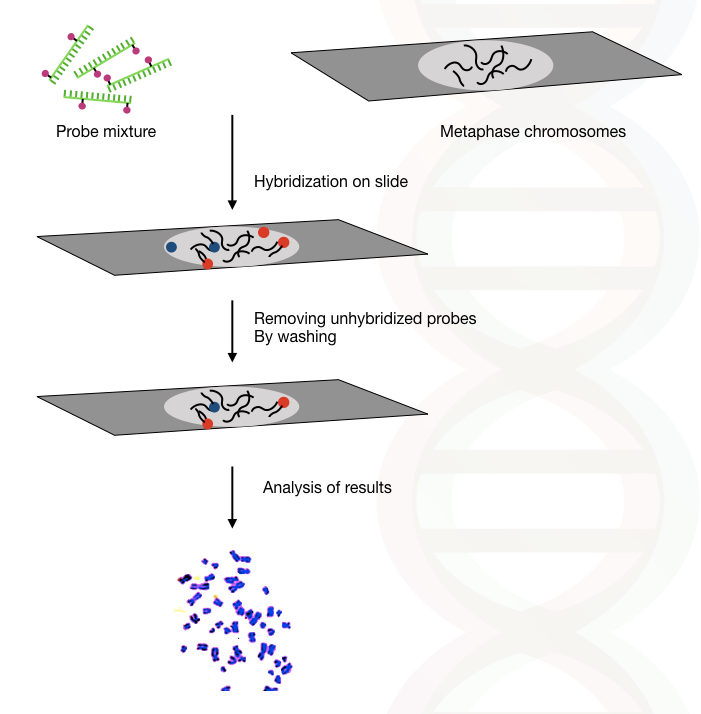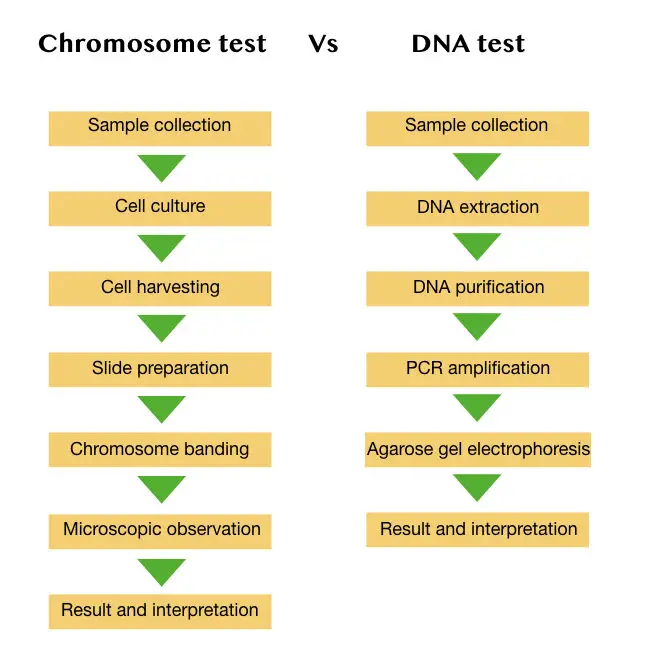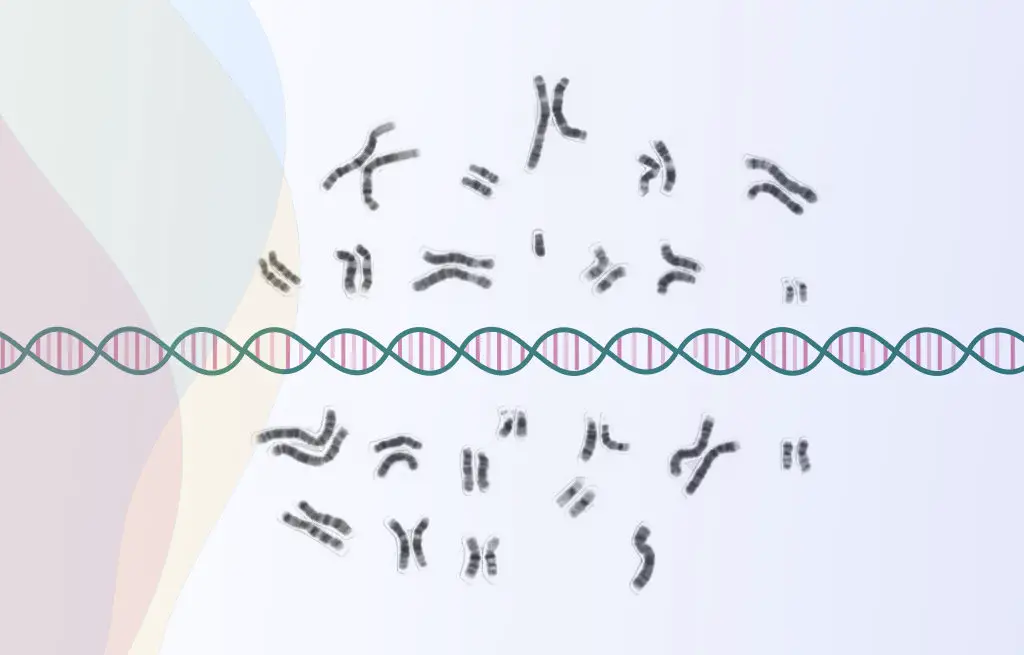“A type of genetic test used to find out either structural, numerical or both type of chromosomal abnormalities is known as chromosome test.”
Trisomy, monosomy, deletion, duplication and translocations are some common chromosomal anomalies observed.
A genetic test is employed for so many different applications. It is used in DNA fingerprinting to maternal cell contamination detection.
However, the major application of the genetic test is for diagnosis of disease, either DNA test or chromosome test is used for that.
The cytogenetic analysis often known as chromosome test is used since long and it is one of the traditional method used in the detection of chromosomal abnormalities for more than 25 years.
In the present article, we will give you a quick look for a chromosome test. This FAQs section will help you to understand what the chromosome test is and how it is done.
Key topics:
- What is a chromosome test?
- When to go for chromosome test?
- How to do a chromosome test?
- Chromosome test during pregnancy
- Chromosome test for gender
- Chromosome test cost
- What outcome we can expect after the chromosome test?
- Difference between DNA test and chromosome test
- Conclusion
Read our article on cytogenetics: A Brief Introduction To Cytogenetics [Karyotyping, FISH and Microarray].
Key Topics:
What is a chromosome test?
In layman’s language, we say that a chromosome test is a type of genetic test used to find out any abnormalities associated with one’s chromosomes.
Any structural or numerical abnormalities associated with chromosomes can be determined using the chromosome test.
One of the most popular chromosome test used for that is karyotyping also known as the karyotype test.
However, not only the karyotype is used for chromosomal testing, but FISH (Fluorescent in situ hybridization) is also utilised for it and it is more accurate than the chromosome test.
In recent days, the whole chromosome microarray is practised for detection of all type of copy number variation from all the chromosomes.
The DNA of us is arranged on chromosomes by doing a complex network with proteins. 23 pair of chromosomes are present in each cell, except germ cells which only have a haploid set of chromosomes.
From the total 46 number of chromosomes, X and Y are called the sex chromosomes.
If any portion of the chromosomes deleted, replaced, inverted or translocated to the other chromosome, it causes abnormality.
In addition to this if the number of chromosome changes, it also creates abnormal phenotypes.
Related article: Genetics Basics: A Beginners Guide To Learn Genetics.
Sample for the chromosome test:
Cell culture is one of the common procedure must be followed in a chromosome test, any bodily fluid can be cultured, however, the most common type of samples for chromosome test are:
Blood, amniotic fluid, chorionic villus sample, bone marrow or tissue from the stillbirth.
2 to 5 ml sample is required for the test to perform.
When to go for a chromosome test?
In most of the cases, the chromosome test is preferred during the pregnancy, however, it is also advisable in case of the previous history of genetic abnormalities in the family.
Here are some of the conditions in which you have to go for the chromosomal test:
- In the case of the high-risk pregnancy when the pregnancy screening tests are abnormal.
- Any previous family history of chromosomal abnormality is present.
- In case of the abnormal phenotype associated with any particular chromosomal abnormality is present.
- Leukaemia or myeloma like cancer conditions are detected.
- In case of the recurrent abortions.
- In the case of infertility.
- If a person suffering from the congenital abnormality.
How the chromosomal test is done?
A blood sample is taken from the patient and send to the laboratory within 24 hours for culturing.
The cell sample is cultured for obtaining metaphase chromosomes, a well-separated metaphase chromosome is used for preparing the karyotype of the person.
All the culture procedure are done in aseptic conditions, contamination leads to failure in the experiment.
The cells are cultured for 2 to 3 days for getting enough number of metaphase cells, once reached, the cell suspension harvested for getting metaphases.
By doing chromosomal banding, different patterns on chromosomes are observed which is used to separated different chromosomes from one another.
A cytogenetic expert creates a karyogram based on the banding patterns and length of the chromosomes and detects a structural or numerical abnormality if present.
The expert prepares a karyogram based on the size, shape, number and banding pattern of the chromosomes.
However, it required a lot of experience and expertise to prepare and interpret the karyotype.

Read our article on karyotyping: A Karyotyping Protocol For Peripheral Blood Lymphocyte Culture.
Chromosome test during pregnancy:
Instead of a blood sample, the chromosomal test is done during the pregnancy required amniotic fluid or chorionic villi sample.
Once the AF or CV sample is collected, the sample sent for the whole chromosome culturing.
The whole chromosome culturing is a method used to culture the cells, later, the cells are arrested in the metaphase so that chromosomes can be visible. the procedure for the culturing is almost the same for blood sample as well as the amniotic fluid or chorionic villi sample, although minor modifications are required.
Note: A special set up and culturing conditions are required to culture the amniotic fluid or chorionic villi sample.
In addition to this, a person must be an expert because the AF or CV sample contains a very small amount of fetus cells thus it can not be collected second time once it is wasted.
The chance of abortion is higher during amniotic fluid or chorionic villi sample collected thus the sample is very important.
the chromosome test during pregnancy is performed to detect abnormalities in high-risk pregnancies.
Chromosome test for gender:
One of the important application of the chromosomal test is for detection of gender.
Female has two XX chromosomes while the male has one X and Y chromosomes. Using the chromosomal test, One’s the biological gender can be determined and established.
In some cases, for example, XX male sex reversal, a person is phenotypically male but genotypically female. In those type of cases, the chromosomal test is used as crucial evidence.
Chromosome test cost:
The cost of the genetic test vary from 100$ to 1500$ depends on the type of test.
The typical chromosomal test (karyotyping from blood) cost 42$ to 50 $ or 3000 to 5000INR.
Although, the FISH and whole chromosome microarray are costlier than this.
The chromosome test for amniotic fluid or chorionic villi sample is costlier than the conventional karyotyping.
In short, the price of the test depends on the type of sample used for the chromosome test.
What outcome do we expect from the chromosome test?
I always pray that nobody has abnormal karyogram. But we are scientist we must do our work.
The abnormalities might be,
An abnormal number of chromosomes.
For example, in down syndrome, one extra chromosome of 21 number is observed while in turner syndrome only one X chromosome is present (only 45 chromosomes).
A chromosome has some extra amount of genetic material.
In case of insertion, a part of one chromosome is inserted or added on some another chromosome.
A chromosome has less genetic material.
In chromosome deletions, some part of the chromosome is missing which results in abnormal phenotype.
Some of the common structural, as well as numerical chromosomal abnormalities, are enlisted below,
| Syndrome | Abnormality | Karyogram |
| Down syndrome | Trisomy 21 | 47, XX/XY, +21 |
| Turner syndrome | Monosomy | 45, X |
| Patau’s syndrome | Trisomy 13 | 47, XX/XY, +13 |
| Cri-du-chat syndrome | Deletion | 46, XX/XY, Del 5p15 |
| Prader-Willi syndrome | Deletion | 46, XX/XY, del 15q11-13 |
| Acute myeloid leukemia | Translocation | 46,XX/XY t(9;22)(q34;q11) |
Some minor deletion, duplication or addition can not be detected using the conventional karyotyping method, for that we have to perform some advanced cytogenetic chromosomal tests such as FISH or whole chromosome microarray.
In the FISH, using the sequence-specific probe any structural or numerical abnormalities can be detected. The results of FISH are more accurate than conventional karyotyping method.
Read our article on FISH: A Brief Introduction To Fluorescence In Situ Hybridization (FISH).

The whole chromosome microarray is also based on the probe-based hybridization method but it has power to detection all the copy number variation on all the chromosomes at once (known copy number variations).
Although, the method is costlier than a karyotype test.
Related article: Philadelphia Chromosome, BCR-ABL1 Gene Fusion And Chronic Myeloid Leukemia.
Chromosome test vs DNA test:
Due to the tedious culturing procedure, the chromosomal test is time-consuming. It requires almost 5 days to complete the test.
While the DNA is faster, a result can be obtained within a few hours.
In the chromosomal test, all the procedure must be followed in a sterile area otherwise, it results in a test failure.
Although aseptic conditions are also one of the crucial factor for a DNA test, not necessarily required. We can perform a DNA test in the normal lab area.
In the chromosome test, the results are based on the visual observation and expertise of scientist.
While in the DNA test, if performed well, the results are self-explanatory and easy to interpret.
Amplification is needed in DNA test thus dependent on the PCR while the chromosome test is not based on the PCR.
Read our article on PCR: Polymerase chain reaction.
For doing karyotyping in chromosome test, the sample must proceed as soon as possible.
Any of the biological samples can proceed any time for doing a DNA test. A DNA test is performed on the sample more than 1000 years old.

Conclusion:
Our atmosphere is now highly polluted with chemicals and radiation. Hence the chance of occurring genetic abnormalities is increasing gradually.
As a geneticist, I advise you that everyone should go for chromosome test as well as DNA test. If a girl, your sister or your wife is pregnant and you have any family history of genetic abnormality, don’t take it casually, immediately ask your doctor whether you have to go for a chromosome test or not.


